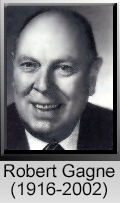Robert Gagne Dies at Age 85
It is with deep sadness that we report the passing of Robert Mills Gagne,  one of the most influential scholars in instructional design. Robert Gagne was born in 1916 in North Andover, MA, received his BA from Yale University in 1937, and earned a doctoral degree in experimental psychology from Brown University in 1940. His professional career, spanning 50 years, included academic as well as research and development positions in military training and human performance.
one of the most influential scholars in instructional design. Robert Gagne was born in 1916 in North Andover, MA, received his BA from Yale University in 1937, and earned a doctoral degree in experimental psychology from Brown University in 1940. His professional career, spanning 50 years, included academic as well as research and development positions in military training and human performance.
He served at Connecticut College for Women (1940); Princeton University (1958-1962); University of California at Berkeley (1966-1969); and Florida State University (1969 to 1985). From 1962 to 1966, he was director of research at the American Institutes for Research in Pittsburgh, PA.
During World War II, Gagne developed tests for classification of air force crew members. Later, at Lackland and Lowry Air Force Laboratories he conducted numerous studies of human learning and performance between 1950 to 1958. As recently as 1990-91, he worked on instructional design models for military training at Armstrong Air Force Base in San Antonio, TX.
Professionals in instructional design and technology know Dr. Gagne best through his seminal book The Conditions of Learning. His other contributions presented in Psychological Principles in System Development (1962); Learning and Individual Differences (1967); Essentials of Learning for Instruction (1974); Principles of Instructional Design (1974); Conditions of Learning & Theory of Instruction (1985); and Instructional Technology Foundations (1987) will remain as classical texts, and will be revisited by students, researchers, faculty and others for many years to come.
In these publications, he linked a taxonomy of learning outcomes with nine instructional events and provided instructional designers with specific strategies that were based on a hierarchy of intellectual skills.
The first time I met Dr. Gagne was in a conference of the Association for Educational Communications and Technology in 1979. He was a kind man with a broad smile, who did not hesitate to share his insights and knowledge with people around him. Our field has lost one of its great contributors, leaders and scholars.
Farhad Saba, Ph. D.
Editor, Distance-Educator.com







